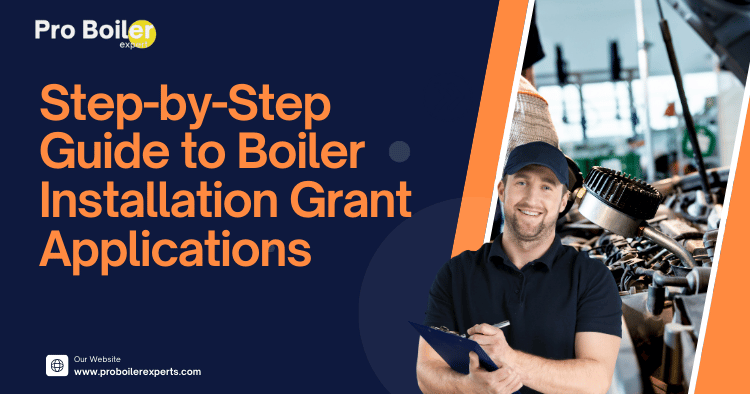Table of Contents
- Introduction
- Understanding Boiler Installation Grants
- Eligibility Criteria
- Gathering Necessary Documentation
- Choosing the Right Grant Program
- Filling Out the Application
- Submitting Your Application
- Following Up on Your Application
- FAQs
- Conclusion
Introduction
Are you considering upgrading your old heating system but worried about the costs? You’re not alone! Many homeowners face the same dilemma. Luckily, boiler installation grants can help ease the financial burden. In this step-by-step guide, we’ll walk you through the application process for securing funding for your new boiler. Don’t worry; we’ll keep it friendly and straightforward!
Many homeowners have found that taking advantage of boiler grants not only helps with costs but also leads to significant savings on energy bills in the long run.
Understanding Boiler Installation Grants
Boiler installation grants are financial aids provided by government programs and organizations to assist homeowners in upgrading their heating systems. These grants are designed to promote energy efficiency and reduce carbon footprints. By utilizing such grants, you can enjoy a reliable heating system while contributing to environmental sustainability.
For detailed information on various grants available, you can visit GOV.UK.
Grants are an excellent way to invest in your home while also helping the planet.
Eligibility Criteria
Before diving into the application process, it’s crucial to determine whether you qualify for a grant. Here are some common eligibility criteria:
| Criteria | Details |
|---|---|
| Income Level | Many grants target low-income households. |
| Property Type | Must be a residential property, often owner-occupied. |
| Existing Boiler Type | Some grants require you to replace an old, inefficient boiler. |
| Location | Availability of grants may vary by region. |
Understanding the eligibility criteria can save you time and effort, ensuring that you focus on grants that are accessible to you.
Check the specific criteria for the grant program you’re interested in to ensure you meet all requirements.
Gathering Necessary Documentation
Once you confirm your eligibility, the next step is to gather the required documentation. This may include:
- Proof of Income: Recent pay slips or tax returns.
- Property Ownership Documents: Title deed or mortgage statement.
- Existing Boiler Details: Model and age of your current boiler.
- Quotes from Installers: Get at least two quotes to provide a competitive estimate.
Having your documentation organized can significantly speed up the application process!
Having these documents ready will streamline the application process.
Choosing the Right Grant Program
Not all grants are the same, and each comes with its own set of rules. Research various programs available in your area. Some of the prominent programs include:
- Energy Company Obligation (ECO): Targeted at low-income households.
- Green Homes Grant: Focuses on improving energy efficiency through various home improvements.
Visit Energy Saving Trust for more information on available grant programs.
Finding the right program is essential, as it can make a significant difference in the amount of funding you receive.
Also look for additional resources regarding the benefits of upgrading your boiler in our article on Top 5 Benefits of Upgrading to an Efficient Boiler.
Filling Out the Application
Now it’s time to fill out the application! Here are some tips to ensure you get it right:
- Read Instructions Carefully: Every grant has specific instructions. Make sure you understand each step.
- Provide Accurate Information: Double-check your entries to avoid delays.
- Attach Required Documents: Ensure all necessary documents are included.
Using a checklist can help you stay organized and ensure that nothing is overlooked!
Consider using a checklist to track your progress.
Submitting Your Application
With your application complete, it’s time to submit it! Depending on the program, you may be able to submit online or via mail. Here’s what you need to do:
- Online Submission: Follow the website prompts to upload all documents.
- Mail Submission: Use a tracked delivery service to ensure your application arrives safely.
Keeping a copy of everything you submit is a good practice, just in case you need to reference it later.
Keep a copy of everything you submit for your records.
Following Up on Your Application
After submission, it’s essential to follow up. Most programs provide a timeline for processing applications. If you haven’t heard back within that period, don’t hesitate to contact the program administrator.
Tips for Following Up:
- Be Polite: A friendly inquiry goes a long way.
- Provide Reference Numbers: If applicable, reference your application number.
- Ask About Next Steps: This shows you’re proactive and eager to proceed.
Following up demonstrates your commitment to the process and can help ensure your application is on track.
FAQs
What if my application is denied?
If your application is rejected, don’t lose hope! Review the reasons given and consider applying again or exploring alternative grants.
How long does the process take?
The timeline varies by program, but most applications take between 4 to 12 weeks for processing.
Can I apply for multiple grants?
Yes, but ensure that you meet the eligibility criteria for each program and understand the rules regarding combined funding.
Remember, persistence is key! Many successful applicants faced rejections before securing their funding.
Conclusion
Securing a boiler installation grant can significantly ease the financial burden of upgrading your heating system. By following this step-by-step guide, you’ll be well on your way to a warmer home and a greener planet. Remember, the right documentation and a thorough understanding of the application process are key to your success. Happy heating!
For more tips and updates on energy efficiency, check out Sustainable Energy Authority of Ireland and consider the benefits of efficient boiler systems as outlined in our articles such as Top 5 Benefits of Choosing Combi Boilers for Your Home and Top 5 Benefits of Condensing Boilers You Should Know.





